

Flora MacDonald. Her father died when she was a child, and her mother was abducted and married by Hugh MacDonald of Armadale, Skye.
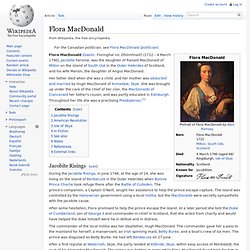
She was brought up under the care of the chief of her clan, the MacDonalds of Clanranald her father's cousin, and was partly educated in Edinburgh. Throughout her life she was a practising Presbyterian.[1] Jacobite Risings[edit] Flora Macdonald - Jacobites, Enlightenment and the Clearances - Scotlands History. Flora MacDonald became a Jacobite heroine when she helped Charles Edward Stuart, ‘Bonnie Prince Charlie’, to evade capture.
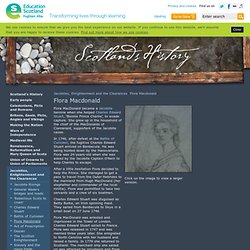
She grew up in the household of the chief of the MacDonalds of Clanranald, supporters of the Jacobite cause. In 1746, after defeat at the Battle of Culloden, the fugitive Charles Edward Stuart arrived on Benbecula. He was being hunted down by the Hanovarians. Flora was 24-years-old when she was asked by the Jacobite Captain O'Neill to help Charles to escape. Edinburgh-Royal Mile-Flora MacDonald. Born in Milton, South Uist, Flora MacDonald had a parentless upbringing, staying with her brother until the age of 13.
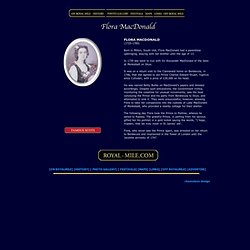
In 1739 she went to live with Sir Alexander MacDonald of the Isles at Monkstadt on Skye. It was on a return visit to the Clanranald home on Benbecula, in 1746, that she agreed to aid Prince Charles Edward Stuart, fugitive since Culloden, with a price of £30,000 on his head. He was named Betty Burke on MacDonald's papers and dressed accordingly. Flora MacDonald who helped Bonnie Prince Charlie escape after Culloden. Flora Macdonald. Flora Macdonald (1722-90) was born in Milton, South Uist, Flora was the daughter of Ronald Macdonald, a tacksman (holder of a grant of clan land) but left her an orphan when only a year old.

Flora MacDonald's mother married a Macdonald of Annadale, in Skye, who, at the time of the Rebellion, commanded one of the militia companies raised on the island by Sir Alexander Macdonald for the services of the government. While visiting her brother at Milton in June 1746, to drive his cattle to their summer pasture, she was awoken one night to be told that she must leave the cattle-tending and assist a prince in distress.
Overview of Flora MacDonald. Reluctant heroine.
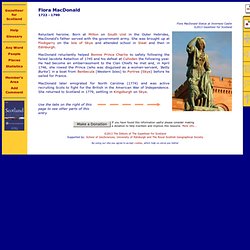
Born at Milton on South Uist in the Outer Hebrides, MacDonald's father served with the government army. She was brought up at Flodigarry on the Isle of Skye and attended school in Sleat and then in Edinburgh. MacDonald reluctantly helped Bonnie Prince Charlie to safety following the failed Jacobite Rebellion of 1745 and his defeat at Culloden the following year. He had become an embarrassment to the Clan Chiefs he met and, in April 1746, she rowed the Prince (who was disguised as a woman-servant, 'Betty Burke') in a boat from Benbecula (Western Isles) to Portree (Skye) before he sailed for France.
MacDonald later emigrated for North Carolina (1774) and was active recruiting Scots to fight for the British in the American War of Independence. Flora MacDonald - Scottish Culture. Picture courtesy of Blair Logie.Flora was born at Milton on South Uist where her father was a tenant farmer.
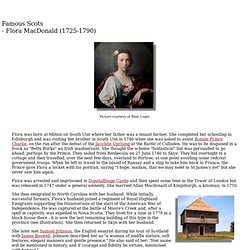
She completed her schooling in Edinburgh and was visiting her brother in South Uist in 1746 when she was asked to assist Bonnie Prince Charlie, on the run after the defeat of the Jacobite Uprising at the Battle of Culloden. He was to be disguised in a frock as "Betty Burke" an Irish maidservant. She thought the scheme "fantastical" but was persuaded to go ahead, perhaps by the Prince. They sailed from Benbecula on 27 June 1746 to Skye. They hid overnight in a cottage and then travelled, over the next few days, overland to Portree, at one point avoiding some redcoat government troops. She then emigrated to North Carolina with her husband. Women in History of Scots Descent - Flora MacDonald. But even in summer, storms are frequent, and very terrible to voyagers.
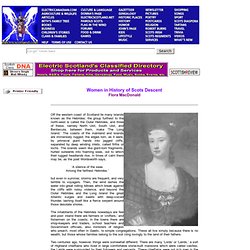
Then, the wind lashes the water into great rolling billows which break against the cliffs with noisy violence, and beyond the Outer Hebrides and the Long Island the great Atlantic surges and swells with deep-voiced thunder, lashing itself like a fierce serpent around those desolate shores. The inhabitants of the Hebrides nowadays are few and poor: inland there are farmers or ‘crofters,’ and fishermen on the coasts; in the towns there are shop-keepers and traders, school teachers and Government officials, also ministers of religion who preach, most often in Gaelic, to simple congregations.
Flora Macdonald (Scottish Jacobite. Flora and Allan MacDonald's story – Scots Abroad: Stories of Scottish Emigration. Flora MacDonald. Events Calendar > Reader’s Theater: Camp Followers Friday, May 2, 7–9 p.m. $5 per person, ages 13 and up; free, children 12 and under with adult To register, call 919-807-7992.
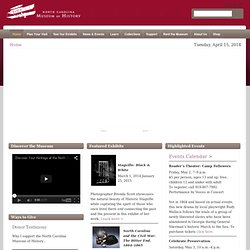
Performance by Voices in Concert Set in 1864 and based on actual events, this new drama by local playwright Rudy Wallace follows the trials of a group of newly liberated slaves who have been abandoned in Georgia during General Sherman’s historic March to the Sea. To purchase tickets click here. Celebrate Preservation Saturday, May 3, 10 a.m.–4 p.m. Celebration Preservation: Moving Midway Saturday, May 3, 1 p.m. Time for Tots: Start Your Engines Tuesdays, May 6 and 13, 10–10:45 a.m. History Corner: A Is for . . . Flora MacDonald. A Brief History. Chapter 92. "Chapter 92.
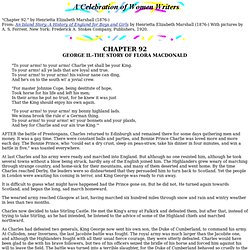
" by Henrietta Elizabeth Marshall (1876-) From: An Island Story: A History of England for Boys and Girls by Henrietta Elizabeth Marshall (1876-) With pictures by A. S. Forrest. New York: Frederick A. Stokes Company, Publishers, 1920. "To your arms! Flora MacDonald's Grave, Kilmuir, Skye. Flora Macdonald's Memorial , Isle Of Skye. Europe is generally agreed to be the birthplace of western culture, including such legendary innovations as the democratic nation-state, football and tomato sauce.
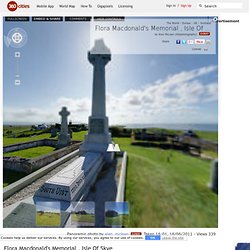
The word Europe comes from the Greek goddess Europa, who was kidnapped by Zeus and plunked down on the island of Crete. Europa gradually changed from referring to mainland Greece until it extended finally to include Norway and Russia. Don't be confused that Europe is called a continent without looking like an island, the way the other continents do. It's okay. The Ural mountains have steadily been there to divide Europe from Asia for the last 250 million years. Europe is presently uniting into one political and economic zone with a common currency called the Euro. Do not confuse the EU with the Council of Europe, which has 47 member states and dates to 1949. Flora MacDonald's Memorial, Kilmuir. Kilmuir Burial Ground In Kilmuir Cemetery, just behind the Museum of Island Life, is a tall memorial to Flora MacDonald, 'Preserver of Prince Charles Edward Stuart'. Despite the romanticism of the Skye Boat Song et al, she was a real and remarkable person.
This is the place to come to and spend a moment reflecting on her amazing courage. She was buried in this graveyard (though not very close to where her memorial stands) in 1790. Flora MacDonald (1722 - 1790. Flora MacDonald's Monument, Isle of South Uist, Outer Hebrides, Scotland. The text below is taken from the monument at Milton: After the Jacobite defeat at Culloden ’Bony Prince Charlie’ faced capture unless he could escape to France. While British government troops were searching for him, he sought refuge in Uist. His supporters wanted to smuggle him from Uist to Skye, and then onto a boat to France. Flora agreed to help them. On 28th June 1746, Flora MacDonald and her Isish maid ‘Betty Burke’ sailed from Benbecula over the sea to Skye. For her part in this bold plot to help ’Bony Prince Charlie’ escape to France, Flora was arrested and imprisoned in London.
Archaeology Hebrides - Flora Macdonald's <em>Birthplace</em>, South Uist. Main Article Location: NF 740 269 The former settlement of Airigh Mhuillin is known as the birthplace of Flora MacDonald, the woman who famously helped Bonnie Prince Charlie to avoid capture after the Battle of Culloden in 1745. This settlement is now thought not to have been her actual birthplace, but there is evidence that she lived here for a time. A monument with an inscription was erected by the Clan MacDonald Society. The remains of several blackhouses and stockyard enclosures are visible among the irises and pasture. Back to top SMR Database Entries Comhairle nan Eilean Siar has an extensive online Sites and Monuments Records database, with in-depth details about the historical, cultural and archaeological sites and monuments in the Hebrides.
Flora MacDonald Statue Inverness Scotland. Flora Macdonald, 1722 - 1790. Jacobite heroine − Johannes Faber − F − Artists A-Z − Online Collection − Collection. Person - Flora Macdonald. Theconfessionsoffloramacdonald - culduie. The Skye Boat Song. "The Skye Boat Song" is a Scottish folk song, which can be played as a waltz, recalling the escape of Prince Charles Edward Stuart (Bonnie Prince Charlie) from Uist to the Isle of Skye after his defeat at the Battle of Culloden in 1746.
Content[edit] Origin[edit] The lyrics were written by Sir Harold Boulton, 2nd Baronet, to an air collected in the 1870s by Anne Campbelle MacLeod (1855–1921), who became Lady Wilson by marriage to Sir James Wilson KSCI (1853–1926) in 1888.